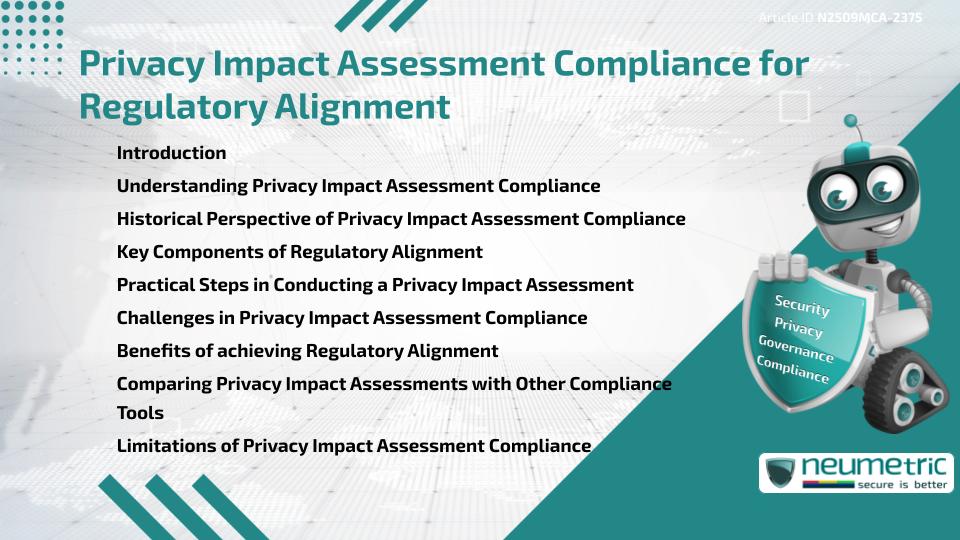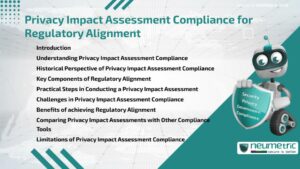Table of Contents
ToggleIntroduction
Privacy impact Assessment compliance is a critical requirement for Organisations handling Personal Data, ensuring that Privacy Risks are identified, managed & mitigated in line with legal frameworks. By aligning with regulatory requirements, Organisations can build trust, avoid penalties & strengthen accountability. This article explores the meaning, history, steps, benefits, challenges & limitations of Privacy impact Assessment compliance, providing a complete overview of its role in achieving regulatory alignment.
Understanding Privacy Impact Assessment Compliance
Privacy impact Assessment compliance refers to the structured process of analyzing how a project or system handles Personal Data & ensuring adherence to legal & Regulatory Standards. It goes beyond a checklist, aiming to predict & minimise Risks before they arise. Organisations use this Compliance Tool to demonstrate accountability under frameworks such as the General Data Protection Regulation [GDPR] and the Health Insurance Portability & Accountability Act [HIPAA].
Historical Perspective of Privacy Impact Assessment Compliance
The idea of assessing Privacy Risks gained momentum in the 1990s when Government agencies in Canada & Australia began formalizing Privacy impact assessments. Over time, the European Union & the United States also adopted similar practices, especially after high-profile data breaches emphasized the need for structured Privacy safeguards. Today, Privacy impact Assessment compliance is not just a best practice but a mandated requirement in many jurisdictions.
Key Components of Regulatory Alignment
Regulatory alignment through Privacy impact Assessment compliance involves several critical elements:
- Identifying Personal Data collected & processed.
- Assessing potential Risks to data subjects.
- Mapping data flows across systems & third parties.
- Documenting safeguards, both technical & organizational.
- Aligning with sector-specific rules such as HIPAA or global frameworks like GDPR.
These steps ensure that Organisations maintain consistency with regulatory expectations & avoid conflicting practices across jurisdictions.
Practical Steps in Conducting a Privacy Impact Assessment
Conducting a Privacy impact Assessment involves systematic planning:
- Define the scope of the project or system.
- Identify the types of Personal Data involved.
- Engage Stakeholders, including Data Protection officers.
- Analyze Risks & their potential impact.
- Recommend controls & safeguards.
- Document the process & outcomes for accountability.
- Regularly review & update the Assessment.
This structured approach helps Organisations stay compliant & agile in a rapidly changing regulatory environment.
Challenges in Privacy Impact Assessment Compliance
Despite its importance, Organisations face hurdles in implementing Privacy impact Assessment compliance:
- Limited resources & expertise.
- Complexity of multinational regulations.
- Resistance to change within internal teams.
- Evolving technologies such as Artificial Intelligence that introduce new Privacy concerns.
These challenges require dedicated effort & strong leadership to overcome.
Benefits of achieving Regulatory Alignment
When Organisations achieve regulatory alignment through Privacy impact Assessment compliance, they gain multiple benefits:
- Reduced Risk of legal penalties & fines.
- Improved Stakeholder trust & transparency.
- Enhanced reputation in the market.
- Streamlined internal processes for data Governance.
These benefits extend beyond compliance, helping Organisations achieve operational excellence.
Comparing Privacy Impact Assessments with Other Compliance Tools
Unlike audits or penetration tests that focus on technical Vulnerabilities, Privacy impact assessments emphasize individual rights & data usage practices. They are proactive, aiming to prevent issues before they arise, whereas many compliance tools are reactive. This makes Privacy impact Assessment compliance uniquely suited for addressing regulatory alignment.
Limitations of Privacy Impact Assessment Compliance
While effective, Privacy impact Assessment compliance has its limitations:
- It can be time-consuming for complex systems.
- Effectiveness depends on organizational culture & follow-through.
- It may not fully capture unforeseen Risks in emerging technologies.
Understanding these limits allows Organisations to complement assessments with additional tools for comprehensive protection.
Takeaways
- Privacy impact Assessment compliance is essential for managing Privacy Risks & aligning with regulations.
- It has historical roots in governmental Policies but is now widely mandated.
- Practical steps involve scoping, analyzing Risks & documenting safeguards.
- Despite challenges, the benefits include trust, reputation & legal protection.
- Organisations should recognize its limitations & use it alongside other tools.
FAQ
What is Privacy impact Assessment compliance?
It is the structured process of ensuring that Privacy Risks in projects or systems are identified, managed & aligned with regulatory requirements.
Why is Privacy impact Assessment compliance important?
It helps Organisations build trust, avoid penalties & demonstrate accountability while protecting individuals’ data rights.
How does Privacy impact Assessment compliance differ from audits?
Audits are often reactive & focus on technical gaps, while Privacy impact assessments are proactive & centered on data usage & Privacy Risks.
Which regulations require Privacy impact Assessment compliance?
Frameworks such as GDPR in the European Union & HIPAA in the United States mandate or strongly encourage such assessments.
What are common challenges in implementing Privacy impact Assessment compliance?
Organisations face challenges like resource constraints, regulatory complexity, resistance to change & new Risks from emerging technologies.
What are the benefits of Privacy impact Assessment compliance?
Benefits include reduced legal Risks, improved trust, enhanced reputation & better internal data Governance.
Can Privacy impact Assessment compliance fully prevent Privacy Risks?
No, it reduces Risks significantly but cannot eliminate them completely, especially in rapidly changing technological environments.
Need help for Security, Privacy, Governance & VAPT?
Neumetric provides organisations the necessary help to achieve their Cybersecurity, Compliance, Governance, Privacy, Certifications & Pentesting needs.
Organisations & Businesses, specifically those which provide SaaS & AI Solutions in the Fintech, BFSI & other regulated sectors, usually need a Cybersecurity Partner for meeting & maintaining the ongoing Security & Privacy needs & requirements of their Enterprise Clients & Privacy conscious Customers.
SOC 2, ISO 27001, ISO 42001, NIST, HIPAA, HECVAT, EU GDPR are some of the Frameworks that are served by Fusion – a SaaS, multimodular, multitenant, centralised, automated, Cybersecurity & Compliance Management system.
Neumetric also provides Expert Services for technical security which covers VAPT for Web Applications, APIs, iOS & Android Mobile Apps, Security Testing for AWS & other Cloud Environments & Cloud Infrastructure & other similar scopes.
Reach out to us by Email or filling out the Contact Form…





